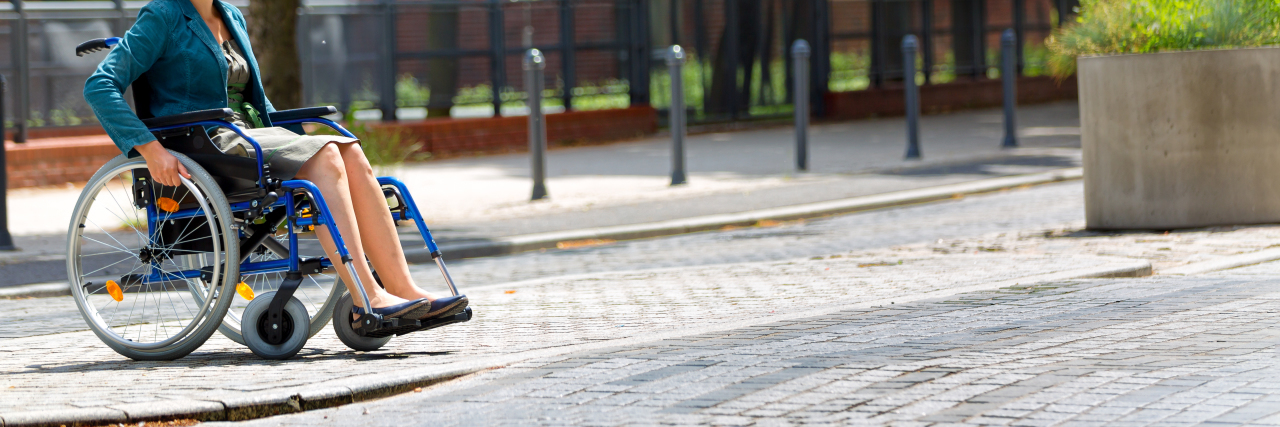I have a love/hate relationship with my wheelchair. I love the freedom and mobility it provides me. I love that I can go practically anywhere with speed. I love that I always get good seats, and I am first in line to board buses and ferries. And it’s always immensely entertaining to watch people prematurely jump like they’ve been goosed when they see me coming from 15 feet away! But I hate how I am perceived by the public because of it. I hate that I’m often seen as more vulnerable, less adult and smaller. That people see my chair first and my face second. That it’s often assumed I am unable navigate the world without aid or supervision.
It frustrates me that I am that exact same woman (with a few added emotional scars and personal growth spurts) as I was before I met my wheelchair, but I’m treated as someone different, even by people who have known me for years. It offends and saddens me that I am seen as “Jennifer” when I’m with my friends and family, but only as “that lady in a wheelchair” when I’m out in public. When did my wheelchair become the most important part of me?
Before I fell ill, which resulted in my disability, I was an average, everyday individual, doing average, everyday things. Stick my ass in a wheelchair and suddenly I’ve become a spectacle, an inconvenience, an inspiration, a threat, an obstacle, a poster-child, an invalid, a source of embarrassment, a child. Anything except an average, everyday individual, capable of doing average, everyday things.
Don’t get me wrong. I am grateful for the kindness of people, and I’ve never been refused aid when I ask. Most of the time, however, I am quite self-sufficient. I do not need you to guide me or watch out for my safety. Please don’t slam your brakes on when I approach the intersection. I promise I do know better than to jump out in front of you, and the drivers behind you will thank you for your composure. If you see me riding down the road in the neighborhood, there is no need to veer into oncoming traffic to avoid me. I stick to my lane, and you should too. It’s very kind of you to want to help me with my groceries without my asking, but I can see you’re already struggling with your own. So how ’bout you let me do me, so you can do you.
I do not require help for most things when I’m out. But when I do, rest assured I will ask for it. And if you ask if I want help, and I say “No, thanks,” it means “No, I don’t want help, but thank you for offering,” It does not mean “I actually do need help, but because I’m in a wheelchair, I don’t know what I want,” or “Ignore my answer and do what you want if it will make you feel good about yourself.”
As much as I hate my wheelchair for what it represents to other people, I love it for what it represents to me. It represents freedom, independence, autonomy and opportunity. Getting my first wheelchair after finally getting out of the hospital was like suddenly being able to run again. So folks, I am not a piece of furniture or a grab rail, and I am not an inanimate object. My wheelchair is a part of me. Grabbing my chair is like grabbing my arm or my shoulder. Also, my being in a wheelchair does not give you license to put your hands on me. In fact, it can even be frightening because I often don’t have the ability to move away from your touch. If you shouldn’t do it to the woman standing next to you, you shouldn’t do it to me.
One last thing: I am not deaf, mute, blind, or intellectually challenged. There is no need to shout at me, speak for me, get close to my face or use slow, simple sentences. Please feel free to communicate with me the way you would any other average, everyday person. It’s just a wheelchair, nothing to be nervous around or afraid of, and there’s no need to drastically alter your course or go out of your way. Wheelchair users do need some accommodations, and we are usually acutely aware of them. The last thing we want is unnecessary “accommodations” that put the spotlight on us, dehumanize us, or put someone else out. We just want to be treated like average, everyday individuals. Dude, don’t make it weird!
Getty image by Apeyron.

